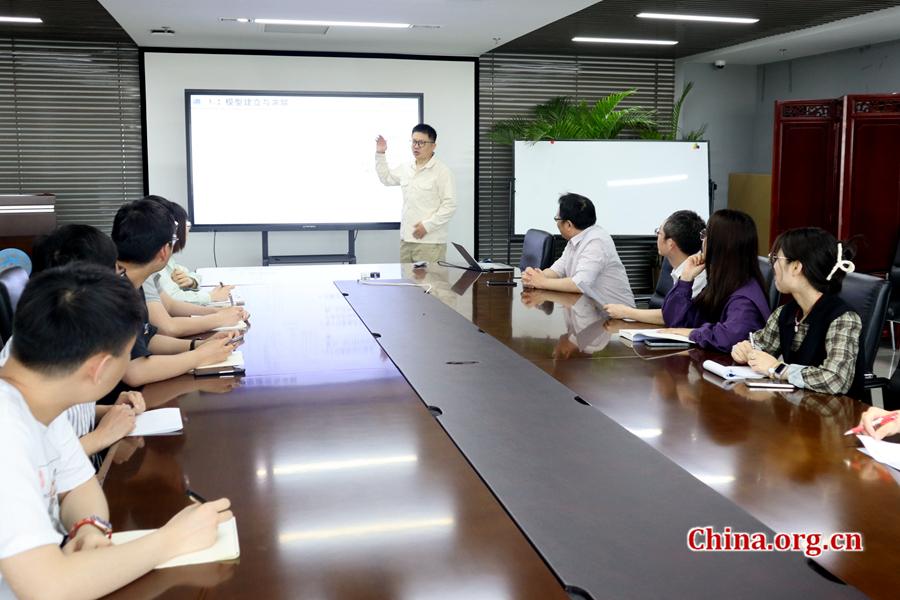Academic urges global cooperation to mitigate traffic congestion
- By Yan Bin
 0 Comment(s)
0 Comment(s) Print
Print E-mail China.org.cn, May 30, 2023
E-mail China.org.cn, May 30, 2023

Associate Professor Han Xiao (center) discusses academic issues with colleagues and graduate students at Beijing Jiaotong University, Beijing, May 9, 2023. [Photo by Yan Bin/China.org.cn]
Traffic congestion poses a formidable challenge in major cities worldwide, including China and the U.S., which have higher car ownership rates. Both countries are faced with problems caused by traffic congestion, including travel time delays, fuel waste and air pollution from vehicle emissions.
"China maintains relative dominance over the U.S. in alleviating traffic congestion and improving traffic efficiency, as we possess a well-developed public transport system and railway transport system with comparatively low per capita carbon emissions," stated Han Xiao, an associate professor at the Institute of Transportation System Science and Engineering, Beijing Jiaotong University (BJTU).
However, with rapid urbanization in China, traffic congestion has become a major hindrance to urban development. Data from the Ministry of Public Security shows that, as of the end of September 2022, there were 82 cities across China with over 1 million cars, leading to increasingly severe congestion in urban areas.
On the other hand, the U.S. excels in utilizing advanced technologies such as adaptive traffic signal control, accurate travel time estimation and route guidance to mitigate congestion. However, INRIX, a transportation data analysis company, reported that four U.S. cities were among the top 10 most congested cities globally.
Han expressed optimism about the prospects for cooperation between China and the U.S., as both countries face similar traffic challenges. "Through technological means, we can improve vehicle carbon emissions and alleviate traffic pressure," he emphasized. According to Han, the current focus for both nations should be deepening academic exchanges, undertaking joint research, and learning from each other to resolve this global problem.
Han also highlighted the growing significance of the transportation supply and demand imbalance, which leads to congestion, pollution, road accidents, and parking difficulties. Therefore, addressing the bottlenecks of traffic development via an Intelligent Transport System (ITS) has become a key focus of urban traffic management.
According to Han, ITS refers to the integrated application of modern technologies and management strategies to transportation systems. Originating from developed countries and regions like the U.S., Japan, and Europe in the 1960s and 1970s, ITS has gained wide recognition as a crucial part of smart cities in recent years.
As a systems expert, Han has extensively studied complex traffic systems since his postdoctoral training at UC Davis. His ongoing research focuses on understanding travelers’ choice behavior in complex transportation systems, highlighting the value of international cooperation and knowledge exchange.
Han, along with his collaborators from both China and the U.S., believes that transport should be a priority in urban planning. They have devoted years to refining car use restrictions, providing more flexible car use restriction policies, and promoting the development of smart cities.
"Through close cooperation, we proposed the game-based dynamic choice model, which offers flexible car use restriction measures," Han noted. "Our behavioral experiments have validated the model’s advantages, demonstrating a lower average driving cost compared to traditional car use restriction policies." Han believes this approach can more effectively address the shortcomings of existing policies and alleviate traffic congestion in major cities worldwide.
Looking ahead, Han emphasizes the need to optimize road conditions using signal lights, traffic rules, autonomous driving, vehicle-road coordination, and vehicle-network coordination. "This requires a concerted effort from a technological perspective and international cooperation," Han added.





